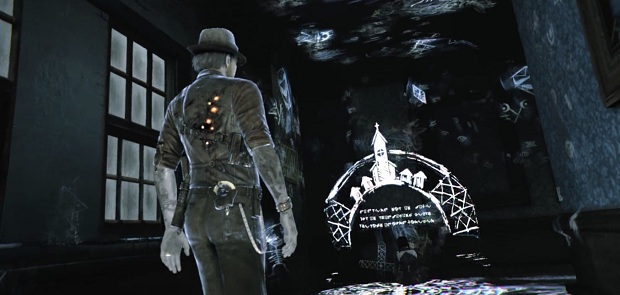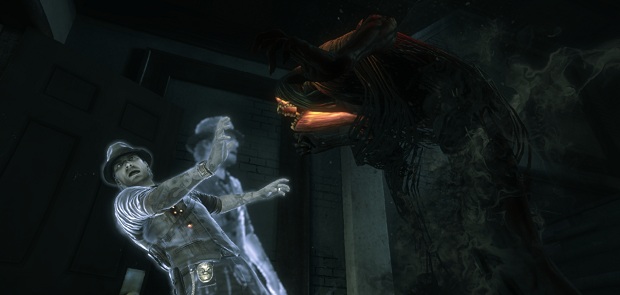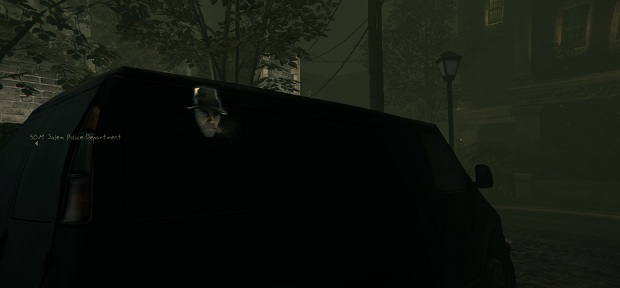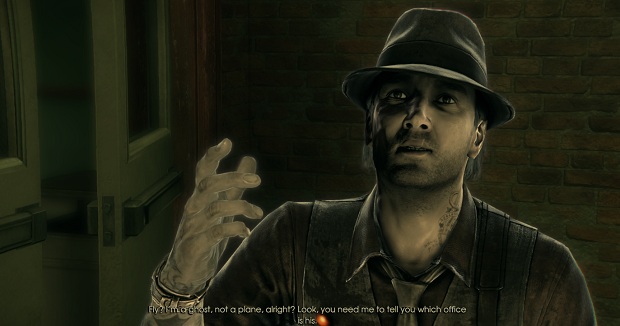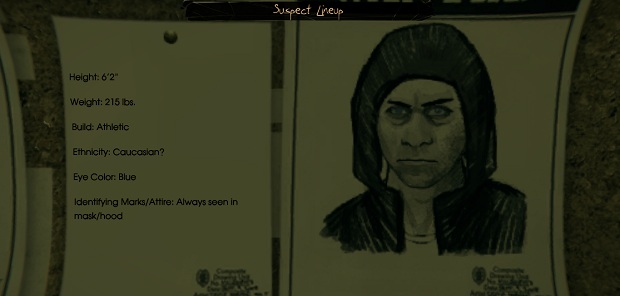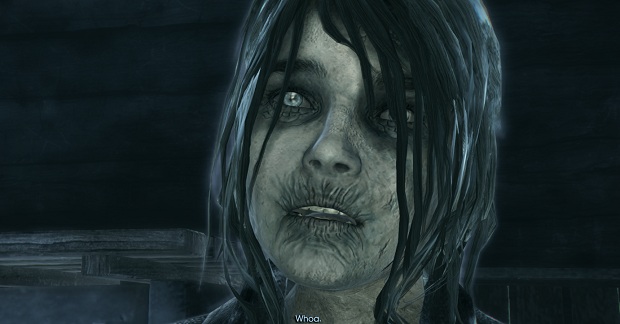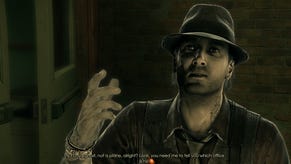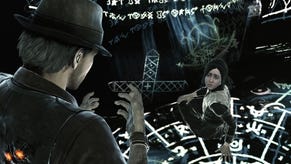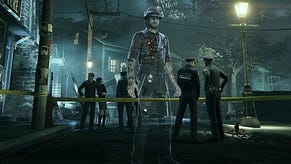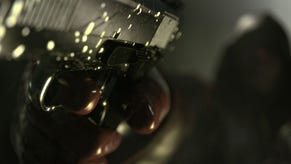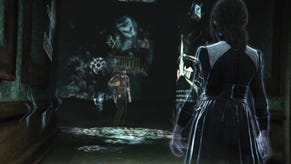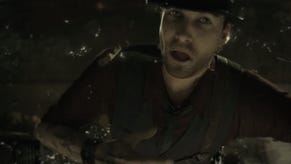Wot I Think: Murdered - Soul Suspect
Paging Dr. Venkman
Murdered: Soul Suspect is the tale of a silly man solving his own stupid murder. It's an insubstantial game that won’t haunt your hard drive or your memory for long, but before I hammer the nails into its coffin, I’m going to talk about the good times and the merriment we enjoyed together. Despite the flimsiness of its mechanics and structure, Airtight’s dead detective drama has a certain hokey charm and I’m glad I spent a few hours in its company, but it’d be best enjoyed with a Mysterious Science Theatre commentary and an audience willing to riff on its weirdly earnest ghost stories. That's the good times done with. Here's wot I think.
You, the player, are Ronan Keating O’Connor (no relation). At the beginning of the game, you die and become a ghost. The first sign that the game may actually be a comedy comes when Ghost Ronan attempts to re-enter his own body, by lying ‘inside’ it. Push the left thumbstick to position his arm just so. Push the left thumbstick to adjust the way his head lies on the ground. Push the left thumbstick to align his phantom limb with his dead leg.
It’s a very silly situation, a grown man lying in the street trying to copy the pose of a corpse. Imagine Hole in the Wall but with a corpse instead of a hole and a tattooed ghost detective instead of a celebrity unflatteringly dressed to look like a few kilos of potatoes in a foil sack. The pre-death sequence, which recaps Ronan’s life by contextualising his million tattoos is also quite silly and is a decent barometer as to the style and quality of the storytelling.
Before moving on to that though, here’s how being a ghost works. Salem has two images, one transposed on top of the other. Ghosts can see the hazy washed out blue-tinged remnants of the past, so a fortress dismantled a century ago juts awkwardly out of a petrol station as seen through Ronan’s eyes. Phantoms can pass through normal structures but can’t pass through the ghostly images. Oh, and if a building has been consecrated (they all have, except a couple of sheds), you’ll need to wait for someone to open a door or window to slip in (always during a cutscene - the town is as dead as Ronan). Ghosts have a rubbish implementation of a noclip mode.
Salem isn’t very large and Ronan only has to visit a few major locations to solve the mystery of his murder. In each of those places, he’ll find one or more investigation scenes, which are a cross between Batman’s Arkham crime scenes, LA Noire’s clue gathering and a redundant game of Simon Says. The solutions that Ronan has to find are so staggeringly obvious that applying any sort of intelligence or lateral thinking to them results in failure. Here’s an example from an early stage of the game.
Ronan is in a church, searching for a witness to his murder. He suspects that she came this way based on evidence he found at the murder scene. During his search of that scene he finds around fourteen clues, several of which relate to this specific witness. A few Salem citizens are seeking sanctuary in the church – half of the town lives in dread fear of a sudden serial killer attack – and there are ghosts scattered about, including a creepy stalker who is sitting beside his living victim (“It’s so much easier now. No walls or locks can keep me away”).
There’s no sign of the witness and Ronan monologues away – “Wasn’t there a clue about the church in that apartment?”
The baker’s dozen of clues I’ve gathered cover details about the witness, her family, her psychic abilities and the killer himself. Selecting any of them results in a red failure outline and a single line from Ronan: “I need to find a clue about the church.” The solution is to select ‘The Church’ from the stack of information. This is how the game functions. If you want to influence someone to think about what they know about the killer, simply click on ‘The Killer’ in your stack of evidence. There are other more complicated clues to gather but they can be happily ignored.
Almost every investigation essentially has Ronan seeking The Solution, which is found by having the player click on The Solution. Simon says the church is important. Even if you’re already in the church, just click on the same clue again. What about all of these other more nuanced pieces of information? Simon doesn’t give a shit.
There’s no deduction involved beyond occasionally acknowledging that you’re in a specific place and trying to solve a murder, and collecting any clues beyond the most obvious ones that sparkle and shine at the forefront of a scene is usually unnecessary. Optional side cases involve clicking on every interactive hotspot near a ghost until Ronan grasps the blindingly obvious cause of and reason for their death.
At one point, a possible drunk driver (now filled with regret and a ghost) can’t remember if he was at the wheel when he crashed, killing himself and two of his friends. Detective Ronan steps in, determined to solve the mystery. The ghost is standing next to a phantom car wreck.
“Maybe this brutal car crash will hold some clues?” Sherlock has nothing on Ronan. The ghost went by the name Brad in life and the car’s license plate is ‘B-Rad’. “Doesn’t look good for Brad.” Nothing gets by this guy.
The eventual solution to that side case is as anticlimactic as Coughlan's syndrome.
During investigations, Ronan can utilise his ghostly powers. These allow him to possess people, which reveals that their heads are as empty as the central mystery of the game. Mindreading reveals the same two sentences playing in a loop, often shared by half of the people in any one part of town, and on the rare occasions when influencing thoughts is possible, you’ll be dipping back into your list of useless clues and going through the same process of elimination.
Being dead, Ronan is no longer a man of action. He does face adversaries, in the form of spooky shrieking wraith-demons, but they’re taken down using stealth. Using X-Ray haunt vision, he can see them through walls, floating about on their patrols, and sneaking up behind allows him to exorcise them. If they do spot him, he can hide in hovering ectoplasm puddles, the remnants of spirits, and jump from one to another. It’s a simple process that breaks up the investigations inoffensively but it isn’t particularly enjoyable.
There are a few extra powers to unlock as the story progresses but they’re tied to story progression rather than the couple of hundred collectibles dotted around. I gathered those bits and bobs obsessively, mostly because the unlockable ghost stories entertained me more than the main narrative, and because Ronan’s (dead) wife’s recollections of their life together are hilarious. His fedora has a backstory. She refers to him as her champion, knight and hero while describing what a complete arse he is over and over again.
To be clear on one point, Murdered doesn’t delve into noir tropes. Apart from his hat, Ronan doesn’t behave like a typical noir antihero at all. He’s a prick with a criminal past, sure, but there’s no evidence of that outside the hidden pieces of personal history. As far as his actions during the eight hours or so of the game are concerned, he seems like a decent enough chap, even if he is a rubbish detective.
Not as rubbish as every other cop in Salem though. Pop quiz – did you expect a connection to the Salem witch trials as soon as you heard that the game was set in the historical town? If so, congratulations, you’re a better detective than every character in the game. There are clear connections between the victims, one of whom was ‘socially known for Wednesday night Ouija board parties’ according to the case files, but the cops are struggling to find any leads whatsoever. Considering how often Occam’s Razor applies during the deduction scenes, someone really should have put forward the idea that Salem’s witchy past is probably involved in the present day killings.
It’s an unsatisfying mystery connected by insultingly obvious detective work and occasional perfunctory stealth sections. But, in an odd way I’m glad I played it. Working out why that might be is trickier than solving my own murder.
Partly, I think that it works as comfort food, like an undemanding B movie that happens to be playing at 3am during an unpleasant bout of insomnia. Collecting all of the glowing things with their bafflingly sincere story fragments is satisfying, in the same way that doing housework can be. It’s still housework though. One of the ghost stories that can be unlocked involves a man unwittingly showering in corpse juice, which provided some much-needed unintentional light relief as I trudged through another gray building.
Then there are the cats. Ronan can’t teleport like the other ghosts because he’s as bad at haunting as he is at thinking. He does learn to teleport later on simply by becoming frustrated that he can't, which prompts a tutorial describing what he should have been doing all along. He'd just misplaced his trigger key! Before that happens though, when he needs to reach higher ground, he possesses cats and does a bit of pussy parkour. That’s daft enough to make me grin and distracts me from the looped animations of the NPCs for a while. They don’t stop emoting, ever, the people of Salem. A distressed murder witness will hold her head, tremble and sigh over and over and over again, trapped in a personal hell until Ronan buggers off and the scene resets.
I’m half-convinced that Murdered was lobotomised at sometime during production. The investigations are so devoid of challenge and intelligence that I wouldn’t be surprised if they were a compromise decided on because the original solutions were too obscure. Perhaps what kept me engaged was the hope that the promise of the ghost detective would pay off but it doesn’t and the game’s best character, a 15 year old medium who becomes Ronan’s partner, hamstrings the process from the second act onwards by acting as the player’s physical presence.
Once you have a willing body to do the heavy (and light) lifting, there’s no real challenge to being a ghost at all. Not that there was to begin with.
Like its protagonist, Murdered is dead on arrival. But if you do play it, gather an audience and have some fun. Sure, you shouldn't speak ill of the dead, but it's the best way to endure this particular afterlife.

